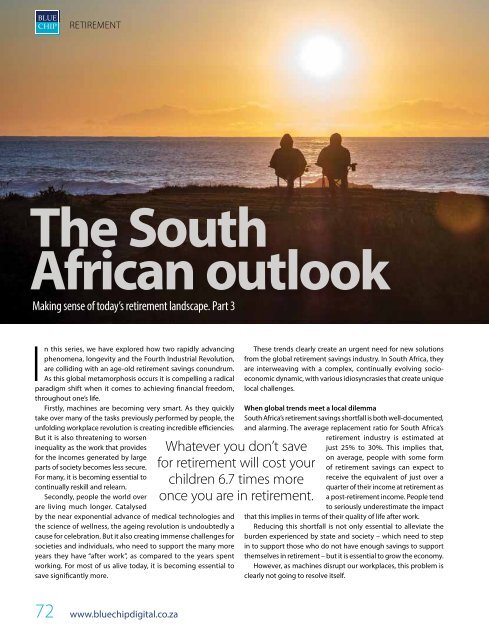Blue Chip Issue 81
Blue Chip is a quarterly journal for the financial planning industry and is the official publication of the Financial Planning Institute of Southern Africa NPC (FPI), effective from the January 2020 edition. Blue Chip publishes contributions from FPI and other leading industry figures, covering all aspects of the financial planning industry. Blue Chip takes this opportunity to wish the FPI a happy 40th anniversary. Congratulations!
Blue Chip is a quarterly journal for the financial planning industry and is the official publication of the Financial Planning Institute of Southern Africa NPC (FPI), effective from the January 2020 edition. Blue Chip publishes contributions from FPI and other leading industry figures, covering all aspects of the financial planning industry.
Blue Chip takes this opportunity to wish the FPI a happy 40th anniversary.
Congratulations!
Create successful ePaper yourself
Turn your PDF publications into a flip-book with our unique Google optimized e-Paper software.
RETIREMENT<br />
The South<br />
African outlook<br />
Making sense of today’s retirement landscape. Part 3<br />
In this series, we have explored how two rapidly advancing<br />
phenomena, longevity and the Fourth Industrial Revolution,<br />
are colliding with an age-old retirement savings conundrum.<br />
As this global metamorphosis occurs it is compelling a radical<br />
paradigm shift when it comes to achieving financial freedom,<br />
throughout one’s life.<br />
Firstly, machines are becoming very smart. As they quickly<br />
take over many of the tasks previously performed by people, the<br />
unfolding workplace revolution is creating incredible efficiencies.<br />
But it is also threatening to worsen<br />
inequality as the work that provides<br />
for the incomes generated by large<br />
parts of society becomes less secure.<br />
For many, it is becoming essential to<br />
continually reskill and relearn.<br />
Secondly, people the world over<br />
are living much longer. Catalysed<br />
by the near exponential advance of medical technologies and<br />
the science of wellness, the ageing revolution is undoubtedly a<br />
cause for celebration. But it also creating immense challenges for<br />
societies and individuals, who need to support the many more<br />
years they have “after work”, as compared to the years spent<br />
working. For most of us alive today, it is becoming essential to<br />
save significantly more.<br />
Whatever you don’t save<br />
for retirement will cost your<br />
children 6.7 times more<br />
once you are in retirement.<br />
These trends clearly create an urgent need for new solutions<br />
from the global retirement savings industry. In South Africa, they<br />
are interweaving with a complex, continually evolving socioeconomic<br />
dynamic, with various idiosyncrasies that create unique<br />
local challenges.<br />
When global trends meet a local dilemma<br />
South Africa’s retirement savings shortfall is both well-documented,<br />
and alarming. The average replacement ratio for South Africa’s<br />
retirement industry is estimated at<br />
just 25% to 30%. This implies that,<br />
on average, people with some form<br />
of retirement savings can expect to<br />
receive the equivalent of just over a<br />
quarter of their income at retirement as<br />
a post-retirement income. People tend<br />
to seriously underestimate the impact<br />
that this implies in terms of their quality of life after work.<br />
Reducing this shortfall is not only essential to alleviate the<br />
burden experienced by state and society – which need to step<br />
in to support those who do not have enough savings to support<br />
themselves in retirement – but it is essential to grow the economy.<br />
However, as machines disrupt our workplaces, this problem is<br />
clearly not going to resolve itself.<br />
72<br />
www.bluechipdigital.co.za


















